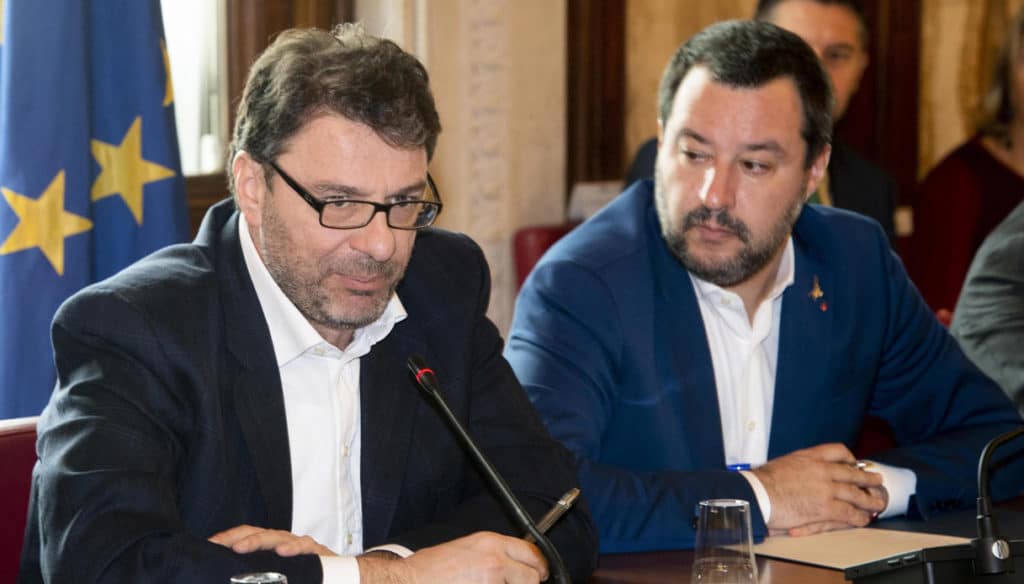While talks go on to form Italy’s next government under former ECB chief Mario Draghi, the leader of the populist, right-wing League swerves surprisingly towards more moderate, less Eurosceptic positions. Could this be the long-awaited normalisation of the Italian right? Paolo Alli, Atlantic Council expert, has more
Matteo Salvini, leader of what has long been a populist, Eurosceptic and hard-right party (the League), seems to be heading for a wholly new direction. Much to the surprise of many (and to the relief of some), he offered near-unconditional support to Mario Draghi, the former head of the European Central Bank tasked with forming Italy’s next no-nonsense government.
This happened on Saturday, after the League delegation met with Mr Draghi for consultations. Mr Salvini declared on air that he and his party were all about pragmatism, available to listen and lend their political forces to the impending reconstruction of the country.
He also signalled that some League ideas coincided with Mr Draghi’s, and – rather surprisingly – embraced Italy’s belonging to Europe, while remarking that he was willing to “participate in a government that would defend Italy’s interests in Brussels head-on.”
“The most relevant detail is the newfound centrality of the League’s leader, who seized [the occasion] to send a signal – which was as important as it was unexpected and thunderous to the [ears] of Italian moderates,” commented Paolo Alli, non-resident fellow at the Atlantic Council and former President of the NATO Parliamentary Assembly.
The change in tone is all the more impressive considering that Mr Salvini has spent the last decade lambasting the European Union and the euro, calling for Italy’s exit from both at times, and campaigning against the “European overlords.” In a 2017 tweet, he had pointed the finger at Mr Draghi in his capacity as ECB chief for the latter’s perceived role in damaging Italy’s economy.
This was a sort of last call for Mr Salvini, argued Mr Alli, because had he not performed this moderate shift, he would had definitely lost the credibility he needed – both at home and in Europe – to eventually lead the country. “[Mr] Draghi saved Europe by saving Italy and vice-versa. [Mr] Salvini knows it, and he also knows that the Italians’ public perception of Europe has reversed its downwards trend, thanks to the [€209 billion in funds and grants] made available to us.”
However, this U-turn has been some time in the making; the mastermind behind it is called Giancarlo Giorgetti, the League’s second-in-command, strategist and responsible for foreign affairs. Crucially, he has acted as a moderate, Atlantist and Europhile counterbalance to Mr Salvini’s opposite, vote-catching impulses for years. He has been campaigning to shift the party towards the centre and have it affiliate to the European family of popular, moderate conservatives, the EPP.
“[Mr] Salvini cannot do without [Mr] Giorgetti’s lucid strategic vision, and [Mr Giorgetti] in turn depends on [Mr Salvini’s] extraordinary capacity to communicate through simple and direct messages,” said Mr Alli. The two have often been in disagreement, but it seems like Mr Giorgetti’s painstaking efforts are finally coming to fruition.
For instance, Mr Salvini would have definitely lost the votes of Northern entrepreneurs, the real, solid core of his support, whose political views tend more towards the centre. They would have not forgiven his former refusal to accept European funds or back the former banker, not during a crippling economic crisis.
The League leader knows that by embracing moderation he will be losing the more extreme, anti-immigration and hard-right voters to Giorgia Meloni’s Brothers of Italy. He also knows that he might earn some from the declining centre-right party of Silvio Berlusconi, once the League completes its transformation into a moderate, centre-right, down-to-the-ground party.
Mr Draghi is likely to imbue his politics with the “social market economy” doctrine, argues the expert, exactly like Angela Merkel’s CDU and the EPP at large. That doctrine entails building a strong, yet inclusive society, balancing the economy’s solidity and the citizens’ welfare. If Mr Salvini completes his radical repositioning, he could reap immense benefits from his support of Mr Draghi’s government.
To do that, however, Mr Salvini must keep his course. For Mr Alli, this means immediately distancing his party from the other hard-right European parties (such as AfD and Marine Le Pen’s National Rally, which belong to the same European party as the League). From there, he could aim to secure the League’s place in the EPP, cementing his position as a responsible, moderate conservative.








